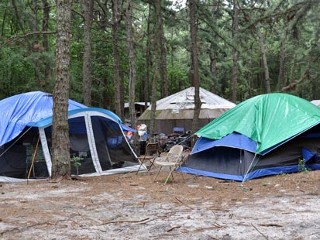
Chagas disease (American trypanosomiasis) is on the increase in the Continental United States. Endemic in the poor areas of Central and South America it is thought to have originally entered the country via immigration.
It’s carried by reduviid bugs that carry the parasite Trypanosoma cruzi and these bugs live in animal nests, under porches, under concrete, in dog kennels and bedding, chicken houses and coops, in brush and between rocky structures as well as in the walls of adobe houses and under tree bark. These bugs tend to bite people on the face and are sometimes called kissing bugs.

Trypanosoma cruzi
In endemic areas the disease is usually contracted directly from the bug bite. In non-endemic areas such as the continental United States it can be contracted from blood transfusion, organ donation or congenitally from mother to child during pregnancy. Only rarely is Chagas contracted through eating uncooked infected food.
It is estimated that between 8-11 million people are infected with Chagas and the vast majority of them do not know even know it.
Chagas has two phases. The acute phase comes first. The onset of the disease often has no symptoms at all. Those cases that do show symptoms may have nothing more than a raised red area around the bite site. On occasions one eye swells and there is a general feeling of malaise. These things pass off relatively quickly, within a few weeks, and the condition goes into remission for up to 20 years.

The chronic phrase starts with constipation and digestive problems, abdominal pain and some difficulty in swallowing. If left untreated 30% of Chagas sufferers will have heart and digestive problems severe enough to cause death
Medical testing of those with chronic Chagas will reveal cardiomyopathy, enlarged liver and spleen, enlarged lymph nodes, heart arrythmias and tachycardia.
It can be treated with two drugs Benznidazole and Nifurtimox both of which are anti parasitic drugs. The treatment itself however is not without side effects. Both drugs can cause:
* headaches/dizziness
* loss of appetite
* weight loss
* sleeping problems
* skin rashes
Doctors have to measure the seriousness of the condition from the test results against the side effects of the drug as some sufferers, particularly those aged over 50 may have worse side effects from the treatment than the issues the Chagas is causing.
There is a much higher incidence of Chagas amongst those people who live in poverty, in sub-standard housing, and previously most people in the United States who have the disease had either brought it with them when they relocated from an endemic area, or had been infected whilst visiting an endemic area. This is changing however, prompting some commentators to refer to Chagas as the ‘New Aids’ of the Americas. There were always some cases of Chagas in the US where the infection was contracted within the United States but they were uncommon, now however more and more doctors are reporting huge upticks in the numbers of cases coming through their offices

| A small tent community in woodland New Jersey |
With poverty increasing across the globe and more people experiencing homelessness and living in areas and conditions that favour the Reduviid bugs that cause Chagas it has the possibility of becoming a slow burn emergency, the extent of which may not be known for two decades.
Take care
Lizzie























